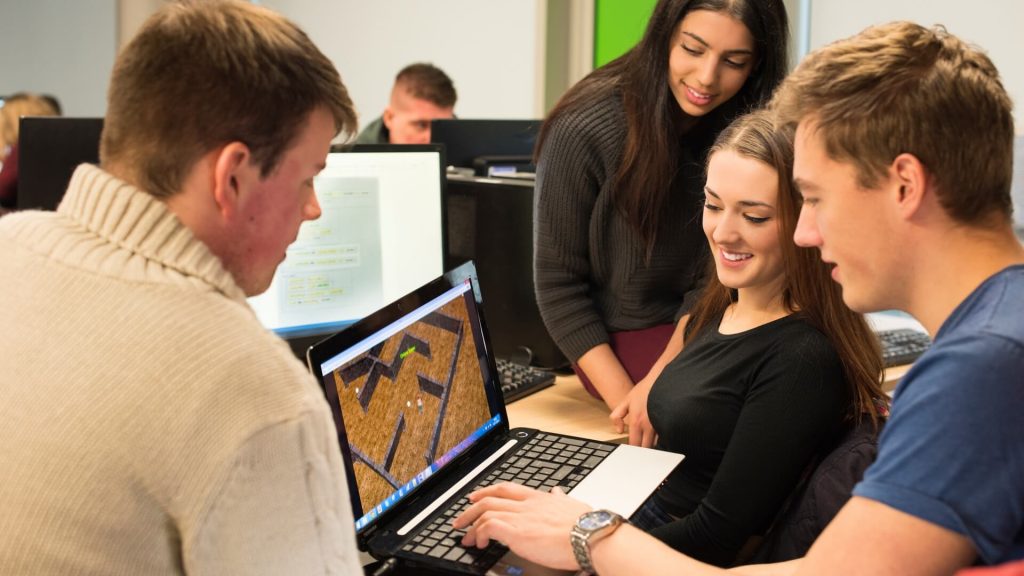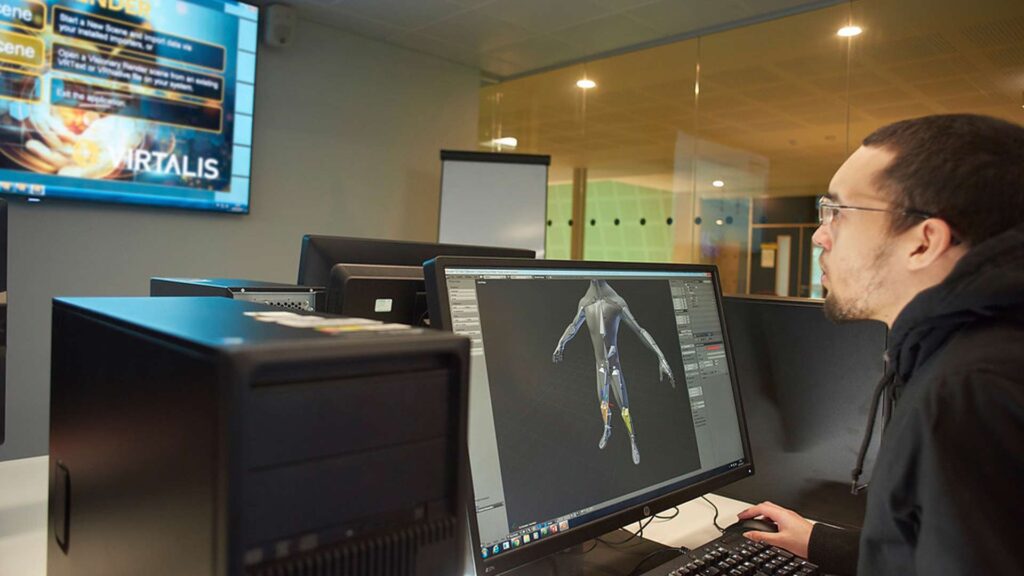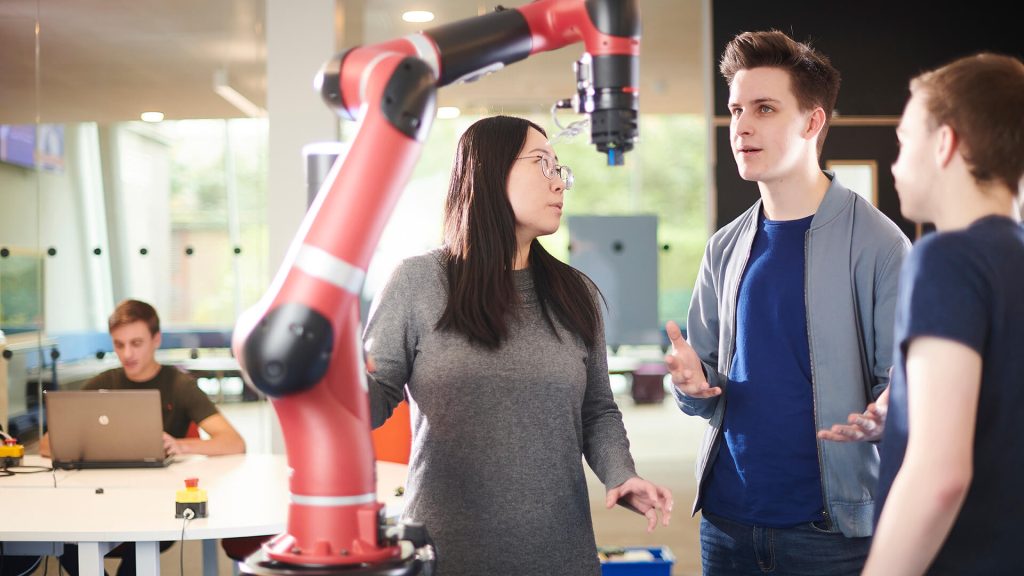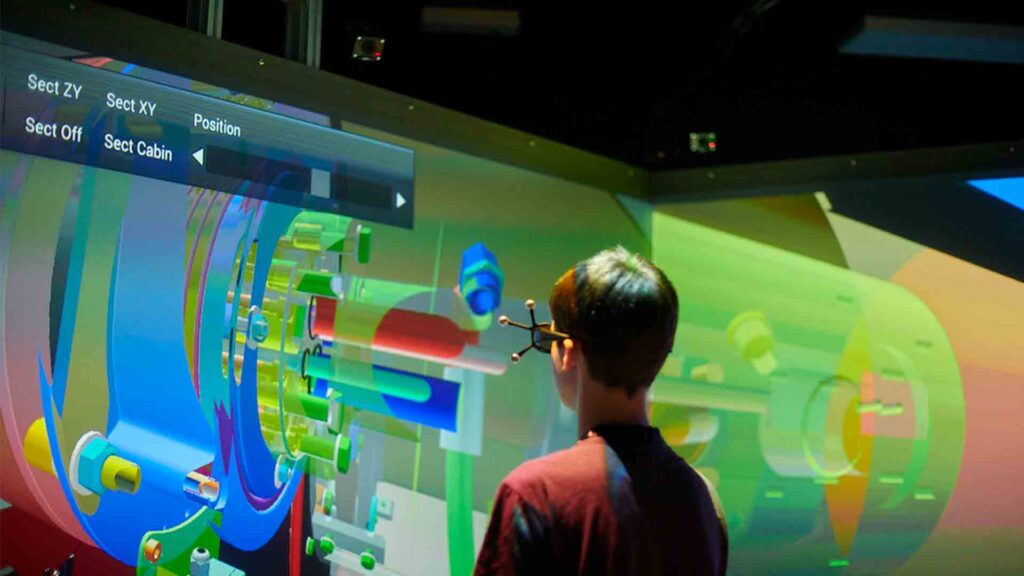Games Development BSc (Hons)
UCAS code: I611
Join an industry whose revenue was estimated at almost 455 billion U.S. dollars in 2024 (Statista, 2024) on our BSc (Hons) Games Development degree. From design to implementation of games software, you’ll have everything you need to launch your career in the games industry.
Overview
| Course length: | 3 years full-time |
|---|---|
| Start dates: | September 2026 |
| Location: | Edge Hill University |
| Example offers: | 104-112 UCAS Tariff points View full entry criteria |
| Subject(s): | Computer Science |
| Faculty: | Arts and Sciences |
| Department: | Computer Science |

Are you interested in a career in games development? You might want to create your own games from scratch as an independent developer. Or you could make your mark within larger organisations on high-profile games. From learning about the design to the implementation of games software, our games development degree allows you to explore multiple opportunities within the computer science sector.
You will be taught by our academic staff who have vast industry experience. We’ll cover the core theories and practices of computer science and games development, as well as a range of subjects such as mathematics for games development, programming languages and 3D modelling.
Learning in our state of the art £13m Tech Hub, you’ll access hardware such as stationary and mobile VR, XR and robotics. Develop the knowledge and skills to create exciting new computer games. You’ll learn modelling and master event-driven program design and graphical user interface, mathematics for games development, and applied design.
We know what you need to stand out in a competitive job market. Our Professional Practice module helps you begin to create a professional portfolio ready to show prospective employers. Optional additional opportunities such as taking accredited courses or completing a sandwich placement will further assist you to launch your career in the gaming industry.
Course features
-
Sandwich year option available
-
Work placement opportunity
-
International students can apply
-
Studying abroad option available
What you'll study
Year 1 is designed to introduce you to the theoretical and practical aspects of game development. From modules in game design, maths and computer science to those centred around programming, we’ll equip you with firm foundations for further study in Years 2 and 3. You’ll also have the opportunity to start showcasing your talent to prospective employers by building a professional portfolio or résumé profile in our Professional Practice module.
In Year 2, you will build on your existing knowledge as well as exploring key areas including game engine familiarity, industry-standard language development, asset development (audio and 2D/3D modelling), and the development of specific gameplay loops. You will also have the option to take accredited courses to enhance your academic learning and gain an in-depth understanding of how the professional workplace functions through a tailored module. You can further enhance your employability skills through a potential sandwich year placement.
You’ll deepen your knowledge and skills in Year 3 through critical topics like game AI, GPU rendering, methods of game interaction and current trends within the games industry. A key focus of the year will be your Research and Development project, where you’ll get the chance to apply everything you’ve learned on your degree by developing a specific artefact that aims to fix a problem or enhancing a current system. Whatever you decide to focus on, this project is designed to showcase the key knowledge and skills that you have developed over the course of your study, serving as a key asset to future employers.
How you'll study
You will be taught via a combination of lectures and seminars which include a range of methods such as reflective practice, workshops, group tutorials and practicals and directed independent study. This range of learning strategies is designed to develop your collaboration skills and foster your problem-solving, decision-making, evaluation and complex thinking skills as well as providing you with opportunities to apply your theoretical knowledge. During a typical week in term time, you will be required to attend sessions for 2/3 days per week, although this may vary.
How you'll be assessed
You will be assessed using a combination of formative and summative assessment methods to ensure you develop the thorough knowledge, understanding and skills required by future employers. Assessment methods may include projects, portfolios, essays and exams. Ongoing feedback linked to progress and learning outcomes is provided throughout the programme to ensure that you are well-prepared for each stage of your academic journey and future professional success.
Who will be teaching you
You will be taught by a range of experts in both Games Development and Computer Science. The department has a wide range of research interests including computer vision, 3d modelling, game audio, AI, robotics and many more. We also try to incorporate industry-led talks and guest lectures throughout the course, focusing on subject-specific topics as well as general computer science concepts.
Where your course includes optional modules, these are to provide an element of choice within the course curriculum. The availability of optional modules may vary from year to year and will be subject to minimum student numbers being achieved. This means that the availability of specific optional modules cannot be guaranteed. Optional module selection may also be affected by timetabling requirements. Some restrictions on optional module choice or combinations of optional modules may apply.
Entry criteria
Typical offer 104-112 UCAS Tariff points, for which no specific subjects are required, plus GCSE Mathematics at Grade C or Grade 4 or above (or equivalent).
Please note, for all programmes in the Department of Computer Science, a level 2 numeracy qualification is not considered as equivalent to GCSE Grade C or Grade 4 in Mathematics.
Example offers
| Qualification | Requirement |
|---|---|
| A Level | BCC-BBC. |
| UCAS Tariff points | 104-112 points. |
| BTEC Extended Diploma (or combination of BTEC QCF qualifications) | Distinction, Merit, Merit (DMM). |
| T Level | Overall grade of Merit. |
| International Baccalaureate (IB) | We are happy to accept IB qualifications which achieve the required number of UCAS Tariff points. |
| Access to Higher Education Diploma | 45 credits at Level 3, for example 9 credits at Distinction and 36 credits at Merit or 15 credits at Distinction and 30 credits at Merit. The required total can be attained from various credit combinations. |
Please note, the above examples may differ from actual offers made. A combination of A Level and BTEC awards may also be accepted.
If you have a minimum of two A Levels (or equivalent), there is no maximum number of qualifications that we will accept UCAS points from. This includes additional qualifications such as Extended Project Qualification (EPQ), AS Levels that haven't been continued to A Level, and General Studies AS or A Level awards.
English language requirements
International students require IELTS 6.0, with a score no lower than 5.5 in each individual component, or an equivalent English language qualification.
If your current level of English is half a band, one band, or one-and-a-half bands lower, either overall or in one or two elements, you may want to consider our Pre-Sessional English course.
Fair Entry Criteria
Our new Fair Entry Criteria is a Contextual Admissions Policy that takes an applicant’s personal and educational background into account. This policy will allow eligible applicants to receive up to a two-grade reduction in their entry requirements for this course. Find out more and see if you qualify.
How to apply
Apply full-time
Read our guide to applying through UCAS to find out more about the application process.
Should you accept an offer of a place to study with us and formally enrol as a student, you will be subject to the provisions of the regulations, rules, codes, conditions and policies which apply to our students. These are available at www.edgehill.ac.uk/studentterms.
If you join a full time undergraduate degree at Edge Hill University, we will guarantee you the offer of a room in our halls of residence for the first year of your course.
Discover our accommodation
Facilities

The Department of Computer Science is based in the state-of-the-art £13million Tech Hub. This purpose-built development offers highly contemporary suites of outstanding facilities for Computer Science and Engineering students. Our modern computing and engineering laboratories are equipped with comprehensive test and measurement equipment, high-specification computers, high-resolution screens and the latest hardware and software.
A four-screen CAVE (Computer Augmented Virtual Environment) provides a super immersive 3D virtual environment, enabling users to immerse themselves in a virtual room and experience real life scenarios in 4K resolution. There are also specialist laboratories for networking and games programming, in addition to a specialist research laboratory, open access laboratory and a Harvard style lecture theatre.
Where you'll study
Learning resources
Learning resources include robots and a robotics simulator, wired and wireless networking hardware, graphics software, web development tools, software development environments, big data servers, eye trackers, giant 3D interactive teaching screens, and other specialist software required for studying forensics and internet security techniques.
Finance
Tuition fees
Fees for academic year 2026/2027 are yet to be confirmed.
The University may administer a small inflationary rise in tuition fees, in line with Government policy, in subsequent academic years as you progress through the course.
EU/EEA and Swiss students who have settled or pre-settled status under the EU Settlement Scheme, as well as Irish nationals, may be eligible for the UK tuition fee rate.
Your future career
As one of the most important sectors in technology today, a career in the gaming industry can take on many forms. You’ll have multiple opportunities to engage in activities that highlight your skills to prospective employers. There will also be a range of events throughout the year, such as games jams, industry talks and careers fairs.
You could apply for jobs such as:
- Games Programmer
- AI Programmer
- Gameplay Engineer
- Engine Developer
- Indie Dev
- C# Developer
- C++ Developer
- Java Developer
Course changes
Every effort has been made to ensure the accuracy of this information, however our courses are subject to ongoing review and development. Changing circumstances may necessitate alteration to, or the cancellation of, courses.
Changes may be necessary to comply with the requirements of professional bodies, revisions to subject benchmarks statements, to keep courses updated and contemporary, or as a result of student feedback. We reserve the right to make variations if we consider such action to be necessary or in the best interests of students.












